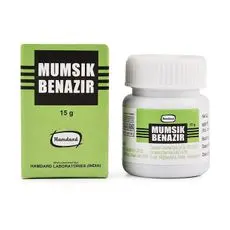 Where should we deliver your order?
Where should we deliver your order?Natural Ayurvedic Remedy for Male Infertility Treatment and Symptoms

Infertility is a common issue among people looking to start a family. If a couple is not getting pregnant after trying for many years, they are considered infertile. Among partners, either one or both can be responsible for infertility. Approximately 5-10% of couples are categorized as infertile, which means they have been trying to conceive with repeated unprotected intercourse for more than a year with no success.
Male Infertility can be caused due to various reasons like low sperm count, low quality of sperm, chronic health issues, illness, and much more. But, it can be naturally treated too with the help of Ayurvedic medicines.
Symptoms of Male Infertility
Male infertility can be a genetic disorder or occur because of hormonal imbalance, testicles, or semen problems; the symptoms vary entirely from man to man.
Below are the common signs and symptoms of male infertility:
- Difficulty with ejaculation because of expanded veins around the testicles or difficulty maintaining an erection.
- Decreased sperm count (less than 15 million sperm per millilitre of semen or total sperm count of less than 39 million per ejaculation) or a small volume of semen ejaculated.
- Loss of respiratory functions (smell) or repetitive respiratory infections.
- Low libido, nightfall, or premature ejaculation.
- Abnormal breast growth (Gynecomastia).
- Pain, swelling, and lump around the testicle area.

Causes of Impotence in Men
Male Infertility can be caused by various issues that impact sperm production and quality. In some cases, the movement or travelling of the sperm is the primary cause of impotence where sperm doesn’t go where it’s supposed to.
Some common causes of impotence in men are related to health, diet, and lifestyle, which include:
- Alcohol and drugs: The use of steroids, cocaine, marijuana, etc., can be the primary cause of male infertility.
- Emotional stress: Stress can trigger certain hormones that produce sperm and result in impotence.
- Lifestyle-generated disorders: Obesity, Diabetes, and Hypertension can cause hormonal and other metabolic changes that reduce male fertility.
- Electromagnetic radiation: Excessive use of a laptop, computer, cell phone, x-rays, etc., can cause infertility as they damage the male sperm cells.
- Malnutrition: Deficiencies of nutrients like vitamin C, selenium, zinc, and folate can lead to infertility.
- Environmental exposure: It includes both indoor and outdoor pollution. Indoor pollution factors also include Pesticides and other household chemicals. On the other hand, outdoor pollution factors include vehicles, factories, etc.

Causes of Male Infertility According To Modern Science
Apart from improper lifestyle, male infertility is caused due to other reasons. Modern science has a different perspective towards the causes of impotence. These causes and factors can be considered health problems separately.
These factors include:
- Azoospermia – A lack of sperm in semen characterizes Azoospermia. It can be a natural disease or caused due to the excessive use of steroids and androgens.
- Oligozoospermia – In this condition, sperm count is low, i.e., less than 20 million per ml of semen, and is responsible for infertility.
- Teratozoospermia: An abnormal morphology of sperms seen in diseases like Crohn’s disease & Hodgkin's disease leads to infertility.
- Aspermia – This condition is responsible for delayed ejaculation of sperm or retrograde ejaculation. The situation occurs when semen enters the bladder instead of ejaculating through the penis.
- Hematospermia – It denotes the blood in semen due to infection of the prostate gland or urethra.
Ayurvedic Overview of Impotence on Men
According to Ayurveda, the channel carrying nutrition to the reproductive system is called Shukravaha Srotas (semen channels). The healthy functioning of Shukravaha Srotas also plays an essential role in maintaining harmony and happiness in a couple’s life.
According to Acharya Charaka, “The man alone without offspring looks like a single tree having a single branch, shadeless, fruitless, and with a foul smell.”
Semen (Shukra Dhatu) is one of the Sapta Dhatus as per Ayurveda texts. It is produced from oleation (Sneha Bhag) of bone marrow (Majja Dhatu).
Shukra Dhatu consists of four elements (Mahabhoot):
- Fire (Tej),
- Air (Vayu),
- Water (AAP) and
- Earth (Prithvi).
It is mild (Saumya) in nature. It develops patience (Dhairya), love (Priti), physical strength (Dehabala), and happiness (Harsha). It also helps in the production of healthy progeny. Also, typical characteristics of Shukra are Sfatikabham (white-like alum), Dravam (liquid), Snigdham (viscid), Madhuram (sweet), and Madhugandhi (honey-like odour).
Ayurvedic Causes for Male Infertility
Ayurveda’s concept of infertility is different in that it views the causes of impotence in another way. The reasons revolve around sperm-related issues like sperm quality, quantity, lifestyle, diet, and psychological factors.
Here are the causes of male infertility as per Ayurveda:
- Congenital Abnormalities (Bija Dosha)
In this situation, defects in the sperm cells decrease the reproductive system’s development, structural abnormalities, chromosomal disorders, and various genetic disorders.









- Sperm Diseases (Sukra Dosha)
Sperm diseases can occur due to poor lifestyle, diet, and other behavioural issues. These causes may vary from person to person. Shukra Dosha includes three factors affecting male infertility as follows:
- Food Factors – These include the overuse of dry, bitter, astringent, salted, sour, and hot foods. The variance in food with the place, time, water, quantity, habit, digestion, doshas, and preparation mode also impacts fertility.
- Behavioural factors – Excessive sexual indulgence, absolute sexual denial, overexertion of the body, suppression of natural excitements, and sexual arousal come under the behavioural factors of Shukra Dosha. Also, habits like sleeping late at night & disturbed lifestyle lead to Rakta and Pitta Dosha’s vitiation, causing Shukra (semen) Kshaya, i.e., decreased amount of Shukra Dhatu.
- Psychological factors – Grief, anxiety, fear, anger, lack of mutual love, and low confidence.
Impotence Treatment in Ayurveda
According to Etiopathogenesis, various methods, including Ayurvedic medicines, can treat male infertility. As per Ayurveda, a specific medication group/therapy named Vajikaran-Chikitsa (Aphrodisiac Therapy) is beneficial for treating impotence. In addition, it plays a vital role in improving the quality, maintaining sexual health, and quantity of sperm.
Some Ayurvedic Medicines For Low Sperm Count and impotence are as follows –
- Shilapravang Special – 1 tablet twice a day with milk
- Tantex Forte – 1 tablet twice a day with normal water
- Basant Kusumakar Rasa – 1 tablet at bedtime with warm water
- Chandraprabha Vati – 2 tablets twice a day with warm water

Along with Ayurvedic medicines, some herbs or spices are also effective for treating male infertility. For different conditions of impotence, various herbs are suggested in Ayurvedic texts.
Some herbs are mentioned below:
- Semen Enhancing Herbs: Shatavari, Ashwagandha, and Muesli
- Semen Purifying Herbs: Sugarcane, Kushtha, and Vasaka
- Increase the fertilization capacity of Semen: Brahmi, Shatavari, and Guduchi
- Libido Enhancing Herbs: Kesar, Garlic, Long pepper, and Clove (Lavanga) (clove)
- Herbs for Premature Ejaculation: Ashwagandha, Chandana, and Asparagus
One can also go for some home remedies for impotence using these herbs.
Ayurveda also proposes a method called Panchakarma Treatment. It combines five procedures that involve elaborated purification to treat the disease effectively.
Panchakarma procedures include:
- Vaman Karma: This is a therapeutic medicinal administration of drugs through the mouth, inducing Vaman Karma (removing toxins from the body through vomiting).
- Virechana Karma: Virechana Karma (Purgation Therapy) is the therapeutic medicinal administration of drugs through the Anus.
- Nasya Karma: Nasal administration of any Ayurvedic medicines to clear the nasal and nervous passage is called Nasya Karma.
- Uttar Basti: The fertility-induced therapy administered through the genitals (male penis).
- Shiro Dhara: This stress reliever therapy helps balance hormonal coordination and treats insomnia.
Diet Recommendations for Male Infertility Treatment
As per Ayurveda, it is essential to change dietary habits for treating male infertility. A healthy and nutritious diet supports medication for effective results.
The diet recommendations include:
- Consume nutritious food and diet rich in micronutrients like milk, carrots, spinach, peas, almonds, honey, and sweet potatoes.
- Include organic and sweet fruits, juices, coconut, and vegetables in your diet.
- Increase the intake of eggs, fresh fruits, nuts, cereals, seafood, and fresh vegetables.
- Avoid foods that lead to constipation, and cause gastric problems.
- Avoid excess salt in your diet, alcohol, astringent, bitter, and sour foods.
Lifestyle Changes for Impotence Treatment in Ayurveda
Lifestyle changes also play an essential role in treating male infertility.
Here are some of the lifestyle changes recommended in Ayurveda:
- Follow a systematic daily way of life (Ayurvedic Dincharya) that includes enough sleep or proper waking patterns, satisfactory sexual activities, and exercises.
- Avoid actions that lead to stress, and suppress urges (Vegavidharan).
- Don’t smoke and drink alcohol.
- Maintain a healthy weight.
- Avoid things that lead to prolonged heat for the testicles because heat can harm the semen quantity and quality.
- Avoid the use of pesticides, chemicals, heavy metals, and other toxins.
- Do Yoga Asanas like Padmasan, Paschimottanasana, Bhujangasana, Sarvangasana, and Trikonasana.
Conclusion
Ayurveda Male Infertility Treatment does not directly affect the hormonal system but plays a vital role in making the reproductive system normal and maintaining equilibrium, resulting in favourable fertilization conditions. Ayurveda considered male sexual dysfunction thousands of years ago and mentioned a unique treatment method named Vajikaran-Chikitsa (Aphrodisiac therapy). Also, appropriate use of plant-based remedies, a proper diet, lifestyle pattern, and Panchakarma therapy are recommended for treating male infertility. Find lifestyle tips and Ayurvedic products at HealthyBazar. All the products on-site are genuine, and one can also consult with Dr Shakti, an Ayurvedic Practitioner with 7 years of experience in male sexual dysfunction/male infertility.
This article is written/approved by:

Dr. Shivani Nautiyal
Dr. Shivani Nautiyal is a renowned Ayurvedic physician, Panchakarma therapies specialist, and detox expert who has made significant contributions to the field of natural holistic healing and wellness. With her profound knowledge, expertise, and compassionate approach, she has transformed the lives of countless individuals seeking holistic health solutions. She is a Panchakarma expert, which are ancient detoxification and rejuvenation techniques. She believes in the power of Ayurveda to restore balance and harmony to the body, mind, and spirit.

 Sexual wellness
Sexual wellnessशीघ्रपतन, सबसे आम Sex समस्या के बारे में 5 फैक्ट जानिए
 Dr. Shivani NautiyalFeb 28, 2026
Dr. Shivani NautiyalFeb 28, 2026 Sexual wellness
Sexual wellnessAyurvedic Herbs for Sexual Wellness: A Natural Approach to Overcoming Premature Emission
 Sonal RaniFeb 28, 2026
Sonal RaniFeb 28, 2026 Health Concern
Health ConcernUnveiling Allopathic and Ayurvedic Sexual Stamina Solutions
 Dr. Shivani NautiyalFeb 27, 2026
Dr. Shivani NautiyalFeb 27, 2026 Health Concern
Health ConcernThe Truth About Ayurvedic Sexual Wellness: Myths and Facts
 Dr. Shivani NautiyalFeb 28, 2026
Dr. Shivani NautiyalFeb 28, 2026 Sexual wellness
Sexual wellness10 Natural Sexual Stamina Supplements to Boost Performance
 Sonal RaniFeb 28, 2026
Sonal RaniFeb 28, 2026 Sexual wellness
Sexual wellness8 Reasons Why You Shouldn't Wait to See a Sexologist
 Dr. Shivani NautiyalFeb 27, 2026
Dr. Shivani NautiyalFeb 27, 2026 Sexual wellness
Sexual wellnessHow Do Sex Hormones affect Women’s Life?
 Dr. Shivani NautiyalFeb 27, 2026
Dr. Shivani NautiyalFeb 27, 2026 Sexual wellness
Sexual wellnessHow does Birth Control Methods Affect Sex Drive and Sexual Desire
 Dr. Shivani NautiyalFeb 28, 2026
Dr. Shivani NautiyalFeb 28, 2026 Sexual wellness
Sexual wellness5 Natural And Ayurvedic Treatment For Vaginal Yeast Infection For Women
 Dr. Shivani NautiyalFeb 28, 2026
Dr. Shivani NautiyalFeb 28, 2026

















